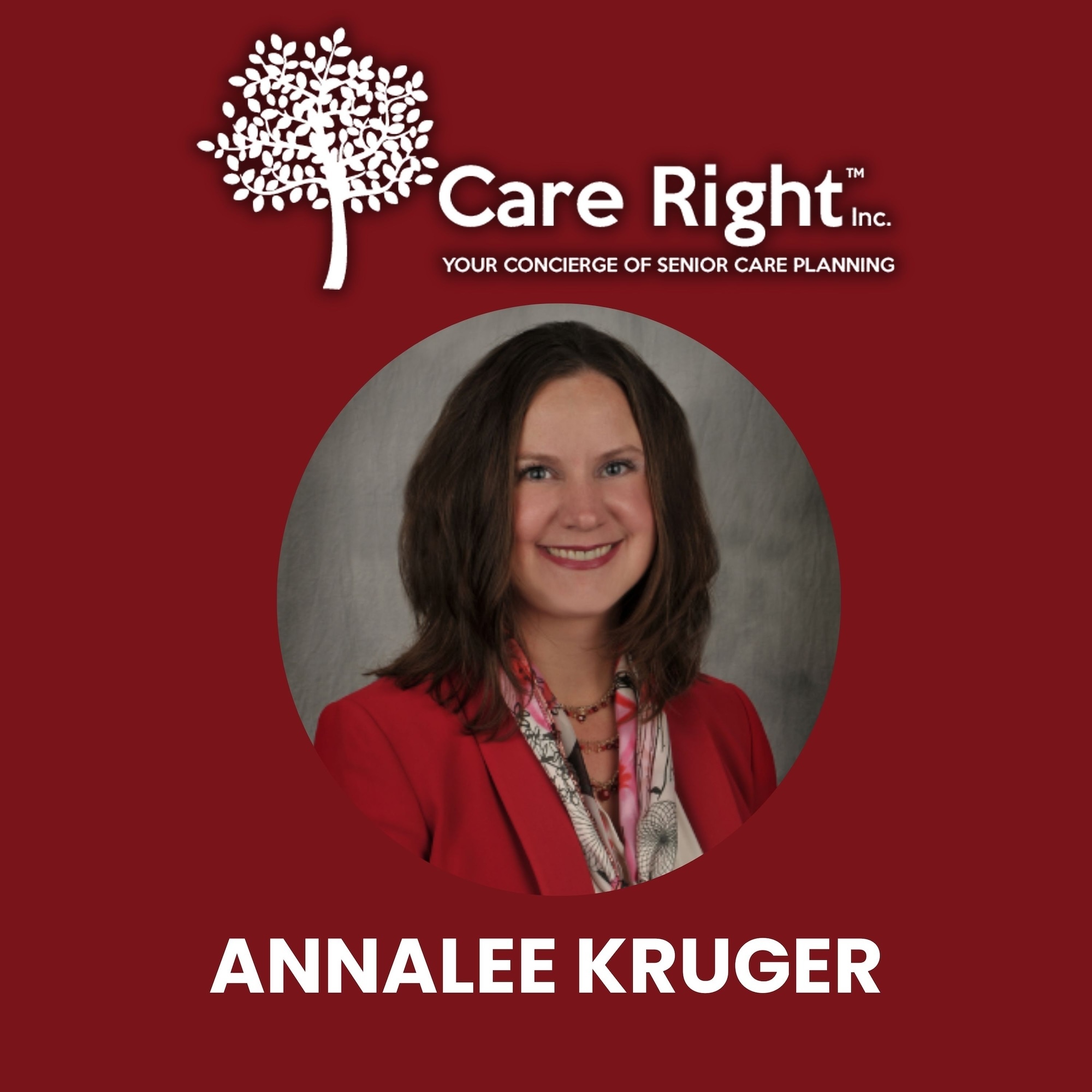
605
Downloads
98
Episodes
Family caregivers across the nation are finding themselves thrust into the role of caring for aging loved ones without ever having any family discussion about the ”what is” of aging. Families are not talking about care needs, caregiver burnout, the costs of care, dementia, other disease progressions, and they aren’t putting proactive plans in place. If you find yourself in this predicament, you need to listen to our ”Tired” podcast series
Episodes
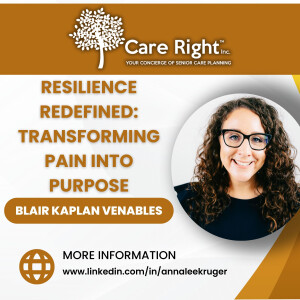
Monday Aug 05, 2024
Monday Aug 05, 2024
Quotes:
- "Resilience is the ability to bounce forward after a difficult time. You're never going back, you're only going forward.”
- "I believe that everyone has a story and that every story deserves to be told.”
- "Sharing your story is a way to healing. You don't have to publicly share it. It can be with a therapist or in a journal, but part of the way to heal is by processing, and by processing, it's by sharing your story."
Takeaways:
- Strengthen your resilience muscle by finding ways to process and share your personal stories of hardship and healing.
- Consider how you can turn your pain into purpose and use your experiences to help empower and support others going through difficult times.
- Reflect on the definition of resilience as "bouncing forward" after challenges, rather than just "bouncing back" to your previous state.
- Identify ways you can support others in your life who may be struggling, by listening without judgment and providing resources to help them build their own resilience.
Conclusion:
Resources:
Guest Links:
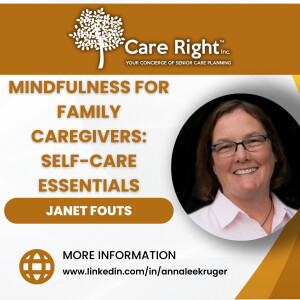
Friday Aug 02, 2024
Mindfulness for Family Caregivers: Self-Care Essentials with Janet Fouts
Friday Aug 02, 2024
Friday Aug 02, 2024
Quotes:
- "If we're not mindful, we lose time when we're not paying attention. Being mindful is really just being present in the moment.”
- "That simple pause for beauty, love, kindness, and gratitude is huge in helping us take care of ourselves and be more resilient.”
- "Being able to recognize that you're overloading yourself and not taking care of yourself helps you see that you need to create space for a little bit of self-care."
Takeaways:
- Incorporate simple mindfulness practices like deep breathing, looking at nature, or holding a meaningful object to help manage stress and overwhelm as a caregiver.
- Regularly assess your own level of caregiver burnout and grit, and don't wait until you're in crisis mode to seek support or implement self-care strategies.
- Create a daily self-care routine, even if it's just a few minutes, to help you stay grounded and resilient in the face of caregiving challenges.
- Identify your personal "springboards" - things that spark joy, gratitude, or positive memories - and use them to lift your spirits when you're feeling depleted.
- Reach out to experts for personalized guidance on incorporating mindfulness, emotional intelligence, and aging planning into your caregiving journey.
Conclusion:
Resources:
Guest Links:
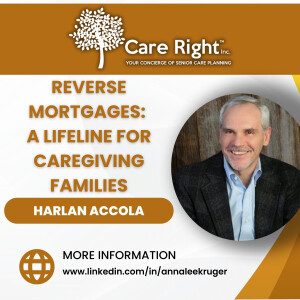
Friday Aug 02, 2024
Reverse Mortgages: A Lifeline for Caregiving Families with Harlan Accola
Friday Aug 02, 2024
Friday Aug 02, 2024
Quotes:
- "Money isn't everything, but it's reasonably close to oxygen. We just need it.”
- "There's nothing more important to me and our team, who work with this throughout the nation, than long-term care.”
- "When families choose to wait until they are in a crisis, emotions are high, time is limited, and big decisions need to be made quickly."
Takeaways:
- Consider using a reverse mortgage as a tool to help fund long-term care and enable aging in place, rather than relying solely on retirement savings or other financial resources.
- Engage with a geriatric care management service before a crisis situation arises, to develop a customized aging plan for your family.
- Educate yourself and your family on the true costs of long-term care and the limitations of Medicare coverage to avoid being blindsided when the time comes.
- Encourage your financial advisor to expand their knowledge on aging-related expenses and solutions like reverse mortgages, as they may not be as informed as specialized experts.
- Plan ahead for long-term care needs, even if you don't currently have an immediate need, to ensure you have the right financial and care solutions in place before a crisis occurs.
Conclusion:
Resources:
Guest Links:
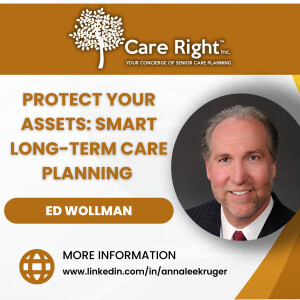
Thursday Aug 01, 2024
Protect Your Assets: Smart Long-Term Care Planning with Ed Wollman
Thursday Aug 01, 2024
Thursday Aug 01, 2024
Quotes:
- "My rule of thumb is we families need to start having these conversations about aging sooner rather than later.”
- "The worst time to try to figure out what those next steps are, is in the stage of a crisis.”
- "If you're making decisions off of poor information, you're going to make poor decisions."
- “When families don't know what they don't know, they make very expensive mistakes.”
Takeaways:
- Schedule a family meeting to discuss aging plans and wishes, including healthcare and financial power of attorney details.
- Create a comprehensive list of all financial accounts, passwords, and important contacts (attorney, financial planner, etc.) to share with your designated power of attorney.
- Research and understand the differences between Medicare and Medicaid coverage for long-term care to avoid costly misconceptions.
- Consult with an elder law attorney to learn about asset protection strategies, especially regarding your home.
Conclusion:
Resources:
Guest Links:

Wednesday Jul 31, 2024
Navigating Healthcare with Clarity and Compassion with Claudia Cometa
Wednesday Jul 31, 2024
Wednesday Jul 31, 2024
Quotes:
- "We aren't putting humans over profit, and that's ultimately where things in society break down.”
- "Your body is actually your greatest ally. The things it does involuntarily every single day to keep you alive are really not against you.”
- "You have the permission to make the decisions you need in your own healthcare, whether that's seeking a second or third opinion or not taking a medication you're not aligned with."
Takeaways:
- Become a proactive, prepared patient - go to appointments with clear goals, questions, and notes to drive the conversation.
- Shift your mindset to view your body as your greatest ally, not an adversary. Befriend your body and engage with it in a collaborative way.
- Empower yourself to make the healthcare decisions you need, whether that's seeking a second opinion or declining a medication you're not comfortable with.
- Reframe your expectations around healthcare - the passive, backseat approach is no longer effective. Take an active role in your care.
- Consider hiring a professional patient advocate to help you navigate the complex healthcare system and ensure your needs are met.
Conclusion:
Resources:
Guest Links:
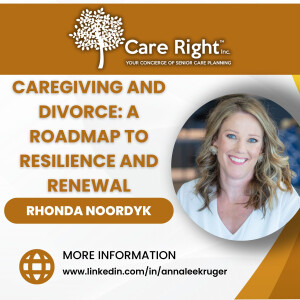
Wednesday Jul 31, 2024
Caregiving and Divorce: A Roadmap to Resilience and Renewal with Rhonda Noordyk
Wednesday Jul 31, 2024
Wednesday Jul 31, 2024
Quotes:
- "Caregiving without an aging plan will derail your career, finances, relationships, marriage, and your own emotional, physical, and financial well-being.”
- "You can't make smart decisions off of wrong information.”
- "We just need to have the tough conversations, and we need to not wait until something bad happens before we take action."
Takeaways:
- Establish a self-care plan as part of your aging plan to maintain your emotional and physical well-being as a caregiver.
- Consider creative ways to offset monthly expenses, such as receiving rent from an aging parent living with you, to help maintain financial stability during a divorce.
- Have difficult conversations about caregiving responsibilities and aging plans proactively before crises arise to ensure your family is prepared.
- Seek out professional guidance, such as a certified divorce financial analyst or aging planning expert, to navigate the complex challenges of caregiving and divorce.
- Prioritize legacy planning to ensure you leave a lasting impact, even in the midst of life's transitions.
Conclusion:
Resources:
Guest Links:
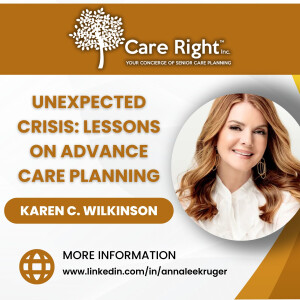
Wednesday Jul 31, 2024
Unexpected Crisis: Lessons on Advance Care Planning with Karen C. Wilkinson
Wednesday Jul 31, 2024
Wednesday Jul 31, 2024
Quotes:
- "If these documents weren't in place and these conversations hadn't occurred, I truly believe he would be deceased, and we would be in financial ruin.”
- "We must do research and have trusted people in medicine, law, and banking—financial experts like you—with care. We need to have those trusted resources we can turn to when we don't know the answers.”
- "Honestly, I'm sad for people who don't have any medical knowledge and just take what is told to them because we trust. I'm not saying that we shouldn't trust; I'm just saying that we must do research."
Takeaways:
- Have open and honest conversations with your family about end-of-life wishes, organ donation, and advance care planning - don't wait for a crisis to strike.
- Create a comprehensive "Grab and Go" binder with all your important legal, financial, and medical documents to ensure your wishes are known and easily accessible.
- Don't let the cost of planning ahead deter you - the potential financial and emotional consequences of not being prepared far outweigh the upfront investment.
Conclusion:
Resources:
Guest Links:
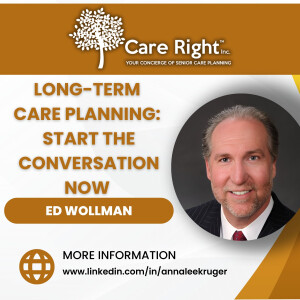
Monday Jul 29, 2024
Long-Term Care Planning: Start the Conversation Now with Ed Wollman
Monday Jul 29, 2024
Monday Jul 29, 2024
Quotes:
- "The key is communicate, communicate, communicate, and do it now while things are still going well.”
- "You have to know about aging, you have to understand dementia. You cannot have your head in the sand.”
- "To avoid family caregiver burnout and resentment, we have to address these issues in the infancy stages."
Takeaways:
- Create a "Grab and Go" binder containing essential information like medical records, legal documents, and financial details for easy access during emergencies.
- Schedule a family meeting to discuss long-term care preferences, financial plans, and potential caregiving responsibilities before a crisis occurs.
- Research and understand the signs of dementia to better support aging loved ones and recognize when intervention may be necessary.
- Develop a safe driving checklist for elderly family members and have regular conversations about when it might be time to stop driving.
- Explore options for aging in place versus assisted living facilities, considering factors like community, healthcare access, and proximity to family members.
Conclusion:
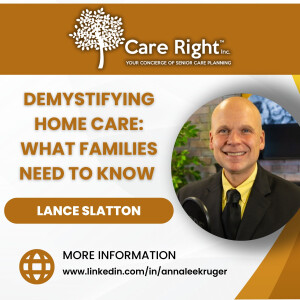
Friday Jul 26, 2024
Demystifying Home Care: What Families Need to Know with Lance Slatton
Friday Jul 26, 2024
Friday Jul 26, 2024
Quotes:
- "We're not going in to take over and take charge; we're there to help support you, not to control, dictate, or tell you what to do.”
- "The care plan is just like reading the back of the book for the first time; you have to actually read the book to know all the specifics and details.”
- "There are all kinds of situations; it's not a one-size-fits-all, and that's what makes caregiving one of the most rewarding experiences but also one of the most difficult."
Takeaways:
- Evaluate your family's long-term care needs and explore home care options before a crisis occurs. Consider scheduling a family meeting to discuss wishes and plans.
- Research and interview multiple home care companies, asking about their hiring practices, background checks, and contingency plans for caregiver absences.
- Investigate funding options beyond Medicare, such as long-term care insurance, VA benefits, or reverse mortgages, to support aging in place.
- Create a comprehensive care plan for your loved one, but remember it's a living document that should be regularly reviewed and adjusted.
Conclusion:
Resources:
Guest Links:
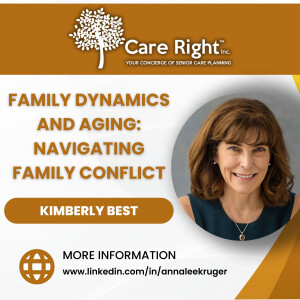
Friday Jul 26, 2024
Friday Jul 26, 2024
Quotes:
- "Most people don't wake up one day and decide today's the day they're going to die." - Kimberly Best
- "The aging process is bumpy, even for the closest-knit families." - Annalee Kruger
- "Quality of life is really important, but it's often at odds with the word safety." - Kimberly Best
Takeaways:
- Families need to talk about aging and end-of-life preferences early on to avoid crises and make sure everyone's wishes are respected.
- Safety matters, but it's just as important to ensure the individual's autonomy and fulfilling experiences aren't compromised.
- Professional mediation can guide families through tough talks, manage disagreements, and find solutions everyone can agree on.
- Documenting life stories can offer comfort and continuity for future generations, making end-of-life planning more impactful.
- Seeing conflicts as problems needing solutions, not battles to win, can result in more efficient and less confrontational outcomes.
Conclusion:
Resources:
